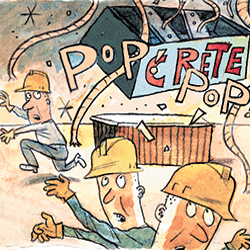My booth was empty, but the shipper swore my crates
had been delivered. The show's receiving manager looked
at the name of the person who signed for the delivery.
"I know that guy," he said. "But he doesn't work here."

As a manufacturer of portable exhibits, my company has done its share of shipping, though most of our freight experiences have been blessedly problem free. Even so, I've heard the shipping-related horror stories floating around the exhibition industry, so I make it a habit to collect a lot of information from the carrier – what time the truck left, the name of the driver and the person signing for the shipment on delivery, what time it was delivered, what he or she had for dinner, etc. I'm just kidding about that last part, but to say I'm diligent and thorough would be an understatement. In fact, I often feel as though I'm asking for way more information than I could possibly need – until a show last spring, that is.
The Mandalay Bay Convention Center in Las Vegas was bustling on Saturday afternoon when I arrived to begin setup for EXHIBITOR2014 (now known as EXHIBITORLIVE). The show was set to open Monday morning and would put our company in front of thousands of exhibit managers. We had a 10-by-20-foot island exhibit that would show off one of our distinct portable designs, and while portable exhibits are easy to install, I had left a day and a half for the project to make sure we had plenty of time. But when I walked up to our booth space to start setting up, I was struck by something odd: It was completely empty.
I called the shipper immediately, because I had received a confirmation of delivery notice, so an empty booth made no sense. The person on the other end of the line assured me that our crates had been delivered. So I hoofed it over to the receiving desk, where a clerk confirmed my fear that the crates were not there.
When I phoned the representative back to inform him that my crates were, in fact, not delivered, he swore they were, saying he had a delivery time and a signature confirming it. I told him that was impossible, because the receiving desk at Mandalay Bay had no record of my shipment ever arriving. We went back and forth in this dead-end exchange while the receiving-desk clerk eavesdropped, shaking his head "no" each time he could hear the shipper insist the freight was there. My head almost exploded when the person on the phone told me it would all be fine because the shipping company would just rent a replacement display for me if, for some reason, my shipment wasn't there. Using someone else's display would be about as effective for my business as taking the money I'd spent on the show and handing it out on Las Vegas Boulevard.
The manager of the receiving area was now at the counter, having noticed that I'd been standing around much longer than normal. He listened to a rundown of my dilemma. "Ask him who signed for the shipment," the manager whispered to me. I jotted down the name that the guy on the phone gave me when I asked, and I handed it over. He studied the name for a minute. "I know this guy," he said. "But he doesn't work here."

At that point I hung up the call with the shipping agent, because it was going nowhere, and I was about to lose my cool. I asked the receiving guy where the man worked if not at Mandalay Bay. "Last I heard, he works for an exhibit house across town," he told me, which caused my jaw to drop for an instant. Why in the world would my stuff be there? Most likely, the clerk said, when the truck made a delivery to the exhibit house, the driver mistakenly unloaded my crates too, and if there were multiple items in the shipment, the person signing for it might not have noticed they didn't belong.
What made the prospect less promising was that it was well past normal business hours at this point, and I'd heard the exhibit house in question was sponsoring a large company party that evening for the show's attendees. The next day was Sunday, and it was unlikely someone would be at the company's office answering the phone. I could break in, I figured, but I wasn't really interested in going home from Las Vegas with a felony.
Whipping out his cellphone, the manager said that he had the owner's phone number and would call in an attempt to reach him. It was all I could do to not hug the guy. The owner of the exhibit house answered and confirmed that yes, a number of items had been delivered that afternoon, and though he didn't know for sure, it was possible something that didn't belong was mixed in. And, in the classiest move ever, he left the party he was hosting to meet us at his warehouse so we could retrieve our freight.
I scrambled for a truck that could make the run and personally rode along across town. As predicted, my crates were sitting amid another shipment inside the loading area. After we had retrieved my freight from his loading area, I shook the owner's hand and thanked him, and then we hauled the errant crates back over to the Mandalay Bay loading docks where they belonged in the first place.
The next day my team and I got our exhibit squared away, and the show went on as planned. I knew, though, that I had really lucked out. What are the odds that the guy in the receiving
department recognized the name of the person signing for my crates and had a cellphone number for his boss – and that the boss answered the phone and was willing to leave an industry party he was hosting?
I won't leave anything to chance next time. I've added a new item to the list of info I request from the shipper: the phone number of who signs for the shipment and where that person is when he or she is signing for it. Given that the shipping documents contain the delivery address, it seems like that last part would be obvious. But I've learned that you can't take anything for granted in this business.
— Eric Miller, president, Tiger Presentations Inc., Westborough, MA




 As a manufacturer of portable exhibits, my company has done its share of shipping, though most of our freight experiences have been blessedly problem free. Even so, I've heard the shipping-related horror stories floating around the exhibition industry, so I make it a habit to collect a lot of information from the carrier – what time the truck left, the name of the driver and the person signing for the shipment on delivery, what time it was delivered, what he or she had for dinner, etc. I'm just kidding about that last part, but to say I'm diligent and thorough would be an understatement. In fact, I often feel as though I'm asking for way more information than I could possibly need – until a show last spring, that is.
As a manufacturer of portable exhibits, my company has done its share of shipping, though most of our freight experiences have been blessedly problem free. Even so, I've heard the shipping-related horror stories floating around the exhibition industry, so I make it a habit to collect a lot of information from the carrier – what time the truck left, the name of the driver and the person signing for the shipment on delivery, what time it was delivered, what he or she had for dinner, etc. I'm just kidding about that last part, but to say I'm diligent and thorough would be an understatement. In fact, I often feel as though I'm asking for way more information than I could possibly need – until a show last spring, that is.  At that point I hung up the call with the shipping agent, because it was going nowhere, and I was about to lose my cool. I asked the receiving guy where the man worked if not at Mandalay Bay. "Last I heard, he works for an exhibit house across town," he told me, which caused my jaw to drop for an instant. Why in the world would my stuff be there? Most likely, the clerk said, when the truck made a delivery to the exhibit house, the driver mistakenly unloaded my crates too, and if there were multiple items in the shipment, the person signing for it might not have noticed they didn't belong.
At that point I hung up the call with the shipping agent, because it was going nowhere, and I was about to lose my cool. I asked the receiving guy where the man worked if not at Mandalay Bay. "Last I heard, he works for an exhibit house across town," he told me, which caused my jaw to drop for an instant. Why in the world would my stuff be there? Most likely, the clerk said, when the truck made a delivery to the exhibit house, the driver mistakenly unloaded my crates too, and if there were multiple items in the shipment, the person signing for it might not have noticed they didn't belong. 


